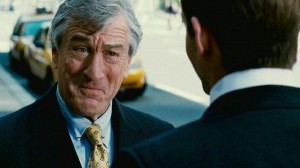Limitless
 You’re always in trouble when you go high concept because it means, if you’re going to be fair to yourself, you shouldn’t take the easy way out and just pile on the clichés. What’s the point of having promise and then going through the motions anyway, considering you’re not interested in developing your own idea? A new idea should be the beginning, sprouting in endless directions — instead of following the beaten path — because the idea is creating its own new path.
You’re always in trouble when you go high concept because it means, if you’re going to be fair to yourself, you shouldn’t take the easy way out and just pile on the clichés. What’s the point of having promise and then going through the motions anyway, considering you’re not interested in developing your own idea? A new idea should be the beginning, sprouting in endless directions — instead of following the beaten path — because the idea is creating its own new path.
Such a wide-reaching metaphor is both the dilemma and subject of Neil Burger’s Limitless, which is about a downtrodden hipster writer with a dirty hippie ponytail. Star/Producer Bradley Cooper obtains a pill that will allow him to access 100 percent of his brain, as opposed to the 20 percent the rest of the world is using (as stated in the film, but that‘s not exactly true*). Will Limitless attempt to explore what happens when one guy in the room is considerably smarter than the others? Or will it succumb to using only 20 percent of its script brain cells? Luckily, the obvious hole in the premise is sidestepped.
 In Limitless, Cooper is able to use 100 percent of his brain all the time; which makes him hyper-aware of his surroundings and always able to access his stored memories and knowledge, no matter how deeply they are buried. Of course that would be exhausting. And one of the side effects of the drug is that it makes Cooper forget to eat, drink or sleep, meaning his brain is using all of its resources to the detriment of the rest of his body. When he eventually crashes or overdoses, dire consequences are inevitable. Did Cooper kill someone when he was on a bender? What happens when you go through withdrawal? Leslie Dixon’s screenplay is better when dealing with those details, as opposed to what Cooper seeks as a result of his new-found powers. Sure, a guy down on his luck will want to fulfill his creative obligations by spitting out a high energy book (his editor refers to it as “grandiose”). And it would make sense for him to want to bask in financial and social success. But is the fact that Cooper becomes a high-yield stock broker who likes to sleep with models supposed to mean that he’s misusing his powers, or that Dixon thinks this is the goal of every person on Earth?
In Limitless, Cooper is able to use 100 percent of his brain all the time; which makes him hyper-aware of his surroundings and always able to access his stored memories and knowledge, no matter how deeply they are buried. Of course that would be exhausting. And one of the side effects of the drug is that it makes Cooper forget to eat, drink or sleep, meaning his brain is using all of its resources to the detriment of the rest of his body. When he eventually crashes or overdoses, dire consequences are inevitable. Did Cooper kill someone when he was on a bender? What happens when you go through withdrawal? Leslie Dixon’s screenplay is better when dealing with those details, as opposed to what Cooper seeks as a result of his new-found powers. Sure, a guy down on his luck will want to fulfill his creative obligations by spitting out a high energy book (his editor refers to it as “grandiose”). And it would make sense for him to want to bask in financial and social success. But is the fact that Cooper becomes a high-yield stock broker who likes to sleep with models supposed to mean that he’s misusing his powers, or that Dixon thinks this is the goal of every person on Earth?
 The subtext to the script is more interesting than its actual contents; how do we know Cooper is a success? Why, he got a haircut and a nice suit and moved out of his ratty Chinatown apartment into a glamorous $8 million home with his blonde girlfriend (Abbie Cornish), who is of course impressed with his new style and digs enough to take him back. She was in love with the clichéd writer version of Cooper, but became disenchanted by his downward spiral into laziness and mediocrity. But this new version of Cooper — whom she finds charming and irresistible (until, of course, she finds out the source of the irresistibility) — is an asshole, through and through. Rude, arrogant, presumptuous, and so “on” as to be utterly insufferable, it’s a perfect role for Cooper, who does the smarmy thing very well. (He’s pretty unconvincing as the unambitious artsy guy.) Dixon doesn’t explore these matters; that Cooper is unctuous precisely because all of his focus is intellectualizing drivel. Cooper can learn new languages in an instant, but what good is this new-found ability to communicate if it’s only used to charm foreign waiters?
The subtext to the script is more interesting than its actual contents; how do we know Cooper is a success? Why, he got a haircut and a nice suit and moved out of his ratty Chinatown apartment into a glamorous $8 million home with his blonde girlfriend (Abbie Cornish), who is of course impressed with his new style and digs enough to take him back. She was in love with the clichéd writer version of Cooper, but became disenchanted by his downward spiral into laziness and mediocrity. But this new version of Cooper — whom she finds charming and irresistible (until, of course, she finds out the source of the irresistibility) — is an asshole, through and through. Rude, arrogant, presumptuous, and so “on” as to be utterly insufferable, it’s a perfect role for Cooper, who does the smarmy thing very well. (He’s pretty unconvincing as the unambitious artsy guy.) Dixon doesn’t explore these matters; that Cooper is unctuous precisely because all of his focus is intellectualizing drivel. Cooper can learn new languages in an instant, but what good is this new-found ability to communicate if it’s only used to charm foreign waiters?
 While Dixon was neglecting her duties, director Burger saw fit to distract us with fancy visuals and a Fight Club-style framing device. (Cooper is a troubled guy battling with his id and is on the verge of suicide, as he narrates his troubles). The visualization of how Cooper sees the world is foreshadowed nicely by Burger’s use of digital composites and zooms to show us the inner workings of every object visible from a single point of view. Though, like the golden wheat fields of 300 (and Gladiator) it’s a style that’s going to date very quickly. Dixon’s script gets in the way of Burger looking into what would happen if others were on the pill and created a level playing field against Cooper. That potentially interesting situation is destroyed by an insistence on turning Limitless into a treadmill thriller, as Cooper is always evading sinister gangsters who want to beat him up and/or kill him. These chase sequences devalue what does work in the movie, before it self-destructs by adding another 20 minutes. After the wraparound narration has concluded, it gives us one of those 1 year later title cards. Why, with Cooper having a different hair color, new ambitions, and a wrap-up to all of the previous nagging problems, the card probably should have just said “1 re-shoot later.”
While Dixon was neglecting her duties, director Burger saw fit to distract us with fancy visuals and a Fight Club-style framing device. (Cooper is a troubled guy battling with his id and is on the verge of suicide, as he narrates his troubles). The visualization of how Cooper sees the world is foreshadowed nicely by Burger’s use of digital composites and zooms to show us the inner workings of every object visible from a single point of view. Though, like the golden wheat fields of 300 (and Gladiator) it’s a style that’s going to date very quickly. Dixon’s script gets in the way of Burger looking into what would happen if others were on the pill and created a level playing field against Cooper. That potentially interesting situation is destroyed by an insistence on turning Limitless into a treadmill thriller, as Cooper is always evading sinister gangsters who want to beat him up and/or kill him. These chase sequences devalue what does work in the movie, before it self-destructs by adding another 20 minutes. After the wraparound narration has concluded, it gives us one of those 1 year later title cards. Why, with Cooper having a different hair color, new ambitions, and a wrap-up to all of the previous nagging problems, the card probably should have just said “1 re-shoot later.”
 With the air sucked out of the movie by its conclusion, you can only look back on it as a wasted opportunity. Generally having Robert De Niro in a supporting villain part in a high-concept thriller is a disaster waiting to happen (such as Godsend and Hide and Seek, which also share a “let’s just throw everything at the wall and hope something works out” ending with Limitless). But here, De Niro gets a nice monologue about how Cooper’s problem is that the drug doesn’t make him do any actual work and makes it hard to respect him, and how his brain power is eliminating his ability to experience life. And then there’s the drug idea (called NZT in the film, probably not a reference to the AIDS drug AZT) that, as a culture, we ask pills to solve all of our problems instead of trying to learn how to cope with our emotions. It’s an idea better realized in John Baumgartner’s Hard Pill, where a gay man consents to take a still-being-tested drug that will make him straight. There’s more pathos and honesty in the way that Baumgartner deals with the fallout than with what Dixon and Burger give us in Limitless. You get the feeling that Dixon’s view of writers as leeches on society is exactly how she feels about them, and that’s why she didn’t even bother finishing her script. Why poison the well with ideas anyway?
With the air sucked out of the movie by its conclusion, you can only look back on it as a wasted opportunity. Generally having Robert De Niro in a supporting villain part in a high-concept thriller is a disaster waiting to happen (such as Godsend and Hide and Seek, which also share a “let’s just throw everything at the wall and hope something works out” ending with Limitless). But here, De Niro gets a nice monologue about how Cooper’s problem is that the drug doesn’t make him do any actual work and makes it hard to respect him, and how his brain power is eliminating his ability to experience life. And then there’s the drug idea (called NZT in the film, probably not a reference to the AIDS drug AZT) that, as a culture, we ask pills to solve all of our problems instead of trying to learn how to cope with our emotions. It’s an idea better realized in John Baumgartner’s Hard Pill, where a gay man consents to take a still-being-tested drug that will make him straight. There’s more pathos and honesty in the way that Baumgartner deals with the fallout than with what Dixon and Burger give us in Limitless. You get the feeling that Dixon’s view of writers as leeches on society is exactly how she feels about them, and that’s why she didn’t even bother finishing her script. Why poison the well with ideas anyway?
* We actually use 100 percent of our brain, but we don’t use it all at the same time (otherwise you could remove most of your brain without any consequence).



